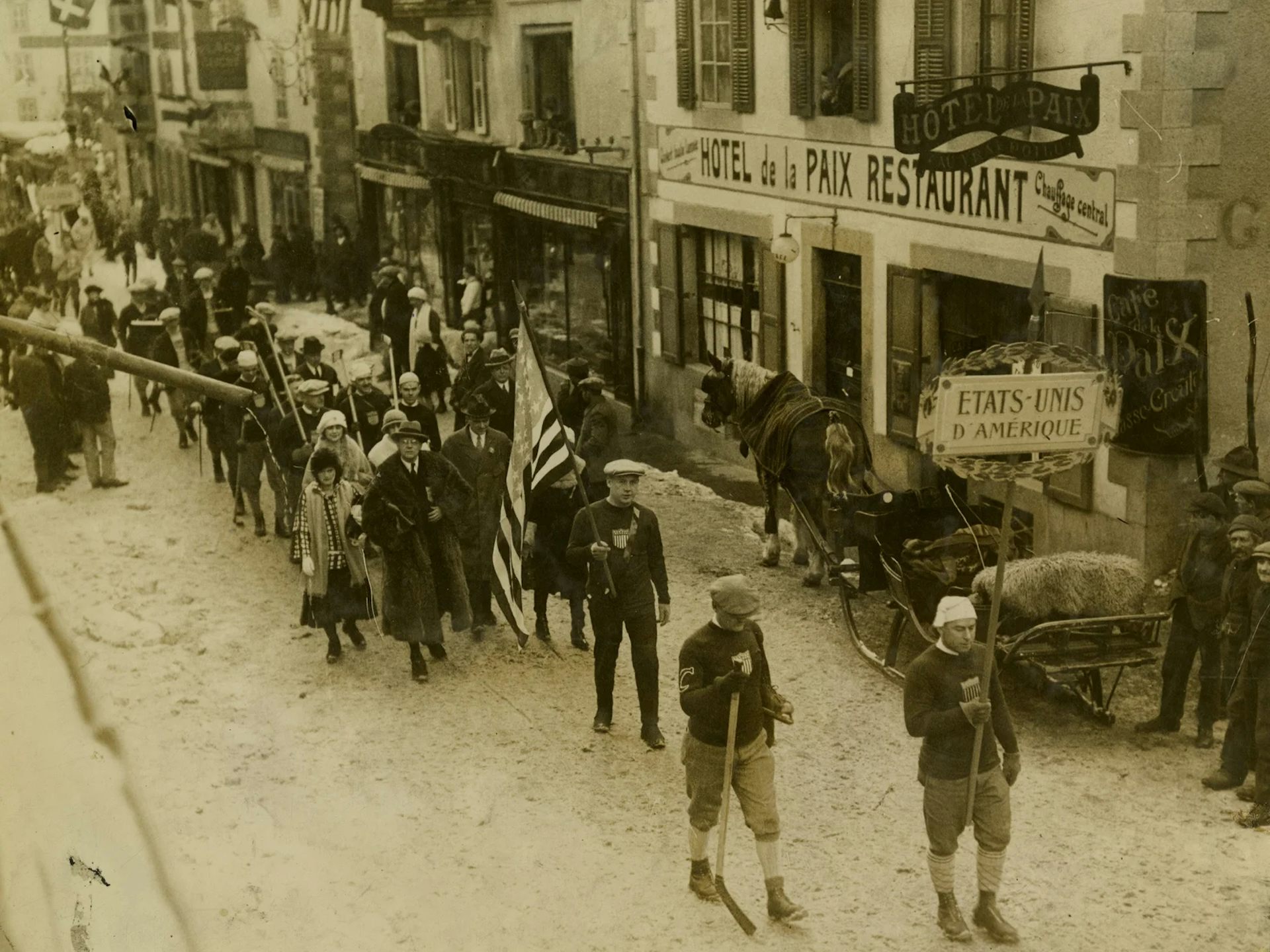'In a perfectly just republic,' Bella Abzug – born a century ago – would have been president
Before presidential candidate Hillary Clinton, before Speaker of the House Nancy Pelosi, there was Congresswoman and firebrand Bella Abzug.
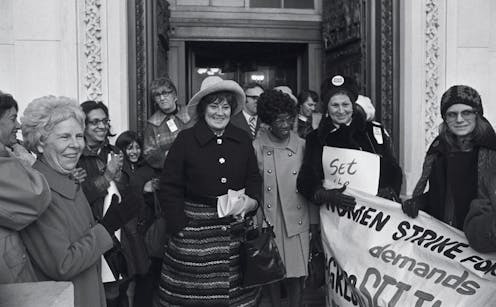
One hundred years ago, on July 24, 1920, Bella Savitzky was “born yelling” in the Bronx, a month before the 19th Amendment gave women the vote. A warrior for every social justice movement of her day, Bella Savitzky Abzug stood on the front lines protesting injustices that still roil this nation.
On the TV series “Mrs. America,” Abzug jousted with feminists Gloria Steinem and Betty Friedan in scenes from the heady, early days of the women’s movement in the 1970s.
But before then, she risked her life to defend an African American man accused of raping a white woman in Mississippi. She fought to “End the Arms Race, Not the Human Race.” She championed labor, marched to end the Vietnam War and celebrated New York, the city that she loved.
Striding into Congress in January 1971, wearing one of her signature hats, she was one of just 15 women sworn to uphold the Constitution, alongside 520 men.
Before presidential candidate Hillary Clinton, and before Speaker of the House Nancy Pelosi, there was Bella Abzug. A firebrand, she served three terms in the House of Representatives before giving up her seat to run unsuccessfully for the Senate. President Jimmy Carter then appointed her to head the commission planning Houston’s 1977 National Women’s Conference.
Although she never again held public office, the famed economist John Kenneth Galbraith wrote: “In a perfectly just republic, Bella Abzug would be president.”
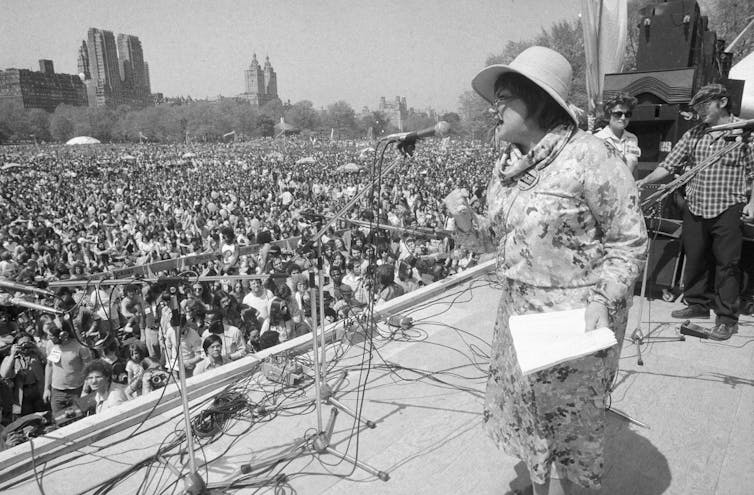
‘This woman’s place is in … the House of Representatives’
In my recent book “America’s Jewish Women: A History from Colonial Times to Today,” I wrote of Abzug’s formative years. The child of immigrants, growing up in a home filled with Jewish traditions and the prophets’ teachings of social justice, Abzug decided to become a lawyer so that she “could set things straight.” Before she was in her teens, she began a lifetime of speechmaking, standing on subway platforms championing Zionism.
Even at Hunter College, New York City’s free public college for women, she was politicking as student government president. Applying to law school, she heard from Harvard: No women allowed. She entered Columbia, became a Law Review editor and graduated in 1945 after marrying Martin Abzug, who typed her papers. Bella refused to learn to type. She knew the first question that would face any woman looking for a desk job, even a “lady lawyer” wearing large hats to stand out, would be, “Can you type?”
She represented the folk singer Pete Seeger before the House Un-American Activities Committee during the Sen. Joseph McCarthy’s Communist witch hunts. In 1951, while in Mississippi defending Willie McGee on the charge that he had raped the white woman with whom he claimed he had a consensual affair, every hotel in town turned her away.
The guy driving her around said he knew of a room but it was far out of town. She told him to take her to the bus station. Eight months pregnant, she spent the night, terrified, in a bathroom stall. She miscarried. McGee died in the electric chair.
In the 1950s, with schoolchildren learning to duck and cover during a nuclear attack, she refused to let her daughters hide under their desks. She joined Women Strike for Peace to ban atomic testing. She brought 2,000 women in the pouring rain to picket the White House. Their signs read: “When it rains, it pours – strontium 90.” They didn’t meet with President John F. Kennedy, but he saw them.
In 1970, campaigning with the slogan “This woman’s place is in the house … the House of Representatives,” she ran for Congress on an antiwar, feminist, anti-racist platform. Six years later, after giving up her safe seat, she lost the Senate Democratic primary by less than 1% of the vote to Daniel Patrick Moynihan. He would represent New York in the Senate for more than two decades.
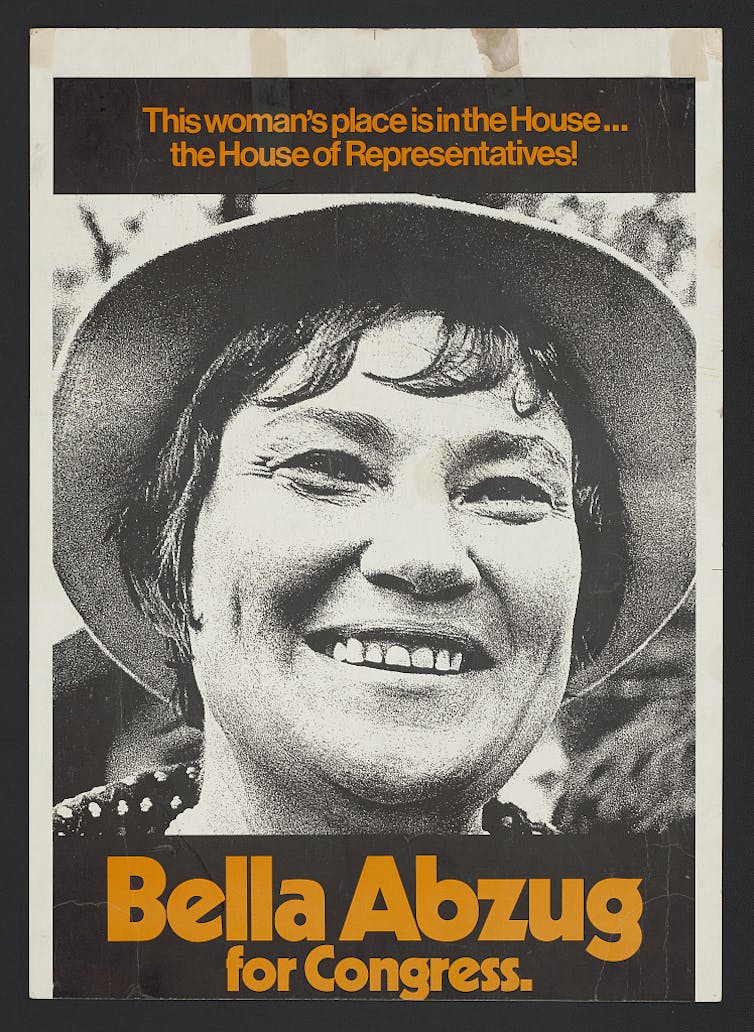
Never gave up
From the moment she stormed into Congress, Abzug began flouting its traditions, starting with “freshmen congressmen should be seen and not heard.”
On her first day on the Hill, she demanded that President Richard Nixon set a date to end the Vietnam War. A month later, she and Rep. Shirley Chisholm introduced a bill that would have provided 24-hour child care across the nation. It passed both houses of Congress. Nixon vetoed it.
On May 3, 1971, as tear gas fogged Washington’s streets and military helicopters whirred overhead, 7,000 anti-war demonstrators – and a couple walking to their wedding – were caught in a police dragnet and herded en masse into RFK Stadium. Abzug jumped aboard a traffic reporter’s helicopter to see for herself how “the Constitution has been suspended,” and how an American football stadium was turned into what she called “a concentration camp.”
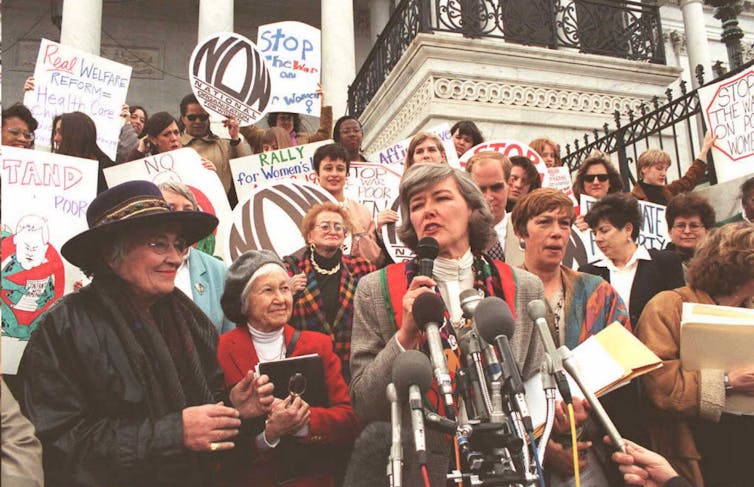
The escalation of bombing in Vietnam that sparked that protest convinced her that Nixon had exceeded his constitutional powers. Abzug called for his impeachment, a year before the Watergate break-in.
Abzug introduced the Equality Act of 1974, the first federal bill to ban discrimination against gays and lesbians. The bill died in committee. No members of the House agreed to co-sponsor it. Yet in the bicentennial year 1976, her congressional colleagues ranked her, after the speaker and majority leader, their “most influential” member.
“Mrs. America” depicts her fighting for the Equal Rights Amendment. Asked when she became a feminist, the congresswoman said she became one the day she was born.
The series also shows her facing anti-Semitism: First lady Rosalynn Carter thought she was “pushy and loud,” she’s told.
“You know that’s code for Jewish,” Abzug shot back.
Although Galbraith thought Abzug could be president, Abzug never did run for that office and lost her other campaigns, including a run to become mayor of New York City. But she kept fighting for justice. She became a co-founder of the Women’s Environment and Development Organization in her last decade, which describes itself as “A global women’s advocacy organization … that promotes and protects human rights, gender equality, and the integrity of the environment.”
Using a wheelchair as breast cancer and heart problems took their toll late in her life, she encouraged her followers: “No matter how steep the passage and discouraging the pace, I ask you never to give in and never give up.”
Abzug never gave up until the day she died, March 31, 1998, in a Manhattan hospital, one borough away from where her story began a hundred years ago.
Pamela S. Nadell does not work for, consult, own shares in or receive funding from any company or organization that would benefit from this article, and has disclosed no relevant affiliations beyond their academic appointment.
Read These Next
What Olympic athletes see that viewers don’t: Machine-made snow makes ski racing faster and riskier
US Olympic skiers and scientists explain the sharp differences between natural snow and machine-made…
Clarence ‘Taffy’ Abel: A pioneering US Olympic hockey star who hid his Indigenous identity to play i
Despite being a foundational figure in American hockey, Taffy Abel – who hid his Ojibwe heritage so…
You’ve reached your weight loss goal on GLP-1 medications – what now?
Due to the body’s natural tendency to restore its former weight, many people regain their lost weight…



